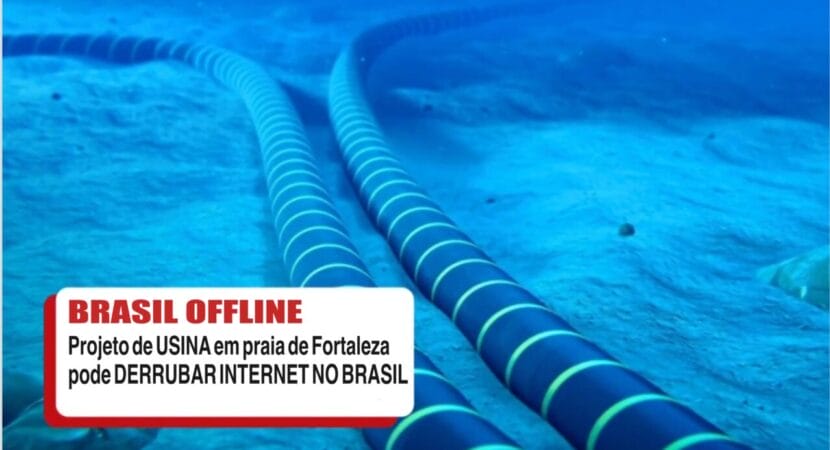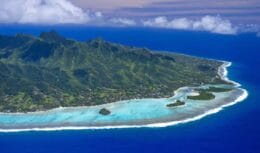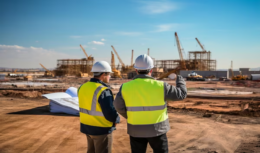
Plant in Fortaleza goes against Anatel and operators, concerned about the risk of fiber optic cables breaking, which could leave Brazil without internet
Approval for the construction of a new desalination plant by the Superintendency of the Union's Heritage in Fortaleza marks a significant advance in technology and sustainability. Located in Praia do Futuro, the installation promises remove salt from sea water, a crucial innovation in times of water scarcity. This project, despite its transformative potential, finds itself at the center of a technological controversy, with concerns emerging about the security of submarine internet cables essential to Brazil's connectivity.
O government of Ceará, through the Water and Sewage Company (Cagece), ensures that the plant does not pose threats to fiber optic cables, defying warnings from the National Telecommunications Agency (Anatel). The security guarantee comes at a critical time, when telecommunications operators express fears of a possible compromise in vital internet infrastructure, putting communication and the flow of information in the country at stake.
The controversy deepens as details of the project are revealed. Strategically positioned on the seabed, the plant not only aims to remove salt from sea water, but also to support the drinking water supply during periods of intense drought in the state. This advance represents a milestone for Ceará, promising a long-term solution to water challenges, while raising questions about the harmonious coexistence between technological advancement and existing infrastructure.
Understand why Anatel maintains a firm stance against the construction of the plant
Praia do Futuro, recognized as a neuralgic point for connectivity between Brazil and Europe, now faces a scenario of technological tension. This location is the first point of contact in Brazil for fiber optic cables coming from Europe, extending to the metropolises of Rio de Janeiro, São Paulo and several countries in Latin America. The integrity of these cables is crucial; any damage could result in a domino effect, affecting internet speed and availability on a continental scale, a prospect that puts users potentially disconnected or facing slow services.
The recent approval of the Union, announced by Cagece, introduces a new dynamic in planning the desalination plant. The change in the proximity of the pipes to the internet cables, from 40 to 567 meters, reflects the security concerns increased by the Anatel. This change is just one of several others recommended by the International Cable Protection Committee (ICPC) to ensure the preservation of submarine cables.
At the heart of this technical debate, the Anatel maintains a firm stance against the construction of the plant in the current location. The agency, which expressed its opposition in September 2022, reaffirms the need to reconsider the location of the project, even after the announced changes. The agency remains uncompromising in its decision, despite the proposed changes, maintaining its focus on protecting critical internet infrastructure. This story is still developing, and deliberations continue to evolve with each new technical opinion and public discussion.
Plant construction could result in a digital blackout
On the horizon of environmental and technological issues, Cagece outlines the next steps for the installation of the desalination plant in Fortaleza. The expectation is to obtain an Installation License from the State Environmental Superintendence (Semace). With the approval of this license, the start of plant construction by March 2024. This movement is critical not only to the advancement of the state's water infrastructure but also marks a significant moment in natural resource management, with a focus on remove salt from sea water.
In contrast, Anatel presents a cautious and critical stance towards the project. Recently closing a working group without reaching consensus, the agency expresses substantial concerns. The fear is that the implementation of the plant could result in a digital blackout, affecting the robust internet network that serves the entire country. According to the agency, the SPE – Águas de Fortaleza project does not include an in-depth analysis of the risks or measures relating to terrestrial and maritime infrastructure, essential for the integrity of submarine cables.
Furthermore, Anatel points out a lack of consideration for the influences that the plant's maritime pipelines may have on the seabed. Specifically, there is a concern about the dumping of high salinity water after the desalination process, which could negatively impact underwater infrastructure. The agency emphasizes that the SPE project disregards the 11 recommendations made by the International Cable Protection Committee (ICPC), signaling a pressing need to review and adapt to safety and environmental protection regulations.
The Government says the project does not pose threats to submarine internet cables
Reaffirming technological security, the Cagece announces with conviction that the infrastructure planned for the new plant in Praia do Futuro is safe, posing no threat to submarine internet cables. Based on in-depth technical studies, the state-owned company argues that the desalination project to remove salt from seawater was meticulously planned to coexist harmoniously with the existing infrastructure. This guarantee is accompanied by the maintenance of the construction schedule, aiming for the plant to operate from July 2024, after obtaining the necessary licenses.
The project led by PES – Águas do Ceará, according to statements, also echoes the feeling of security, ruling out any risks to submarine cables or local data centers. This position is reinforced by the broad support of more than 20 environmental technical opinions that endorsed the Prior License for the execution of the project. The trust placed in these opinions illustrates a commitment to technological and environmental continuity.
Within the scope of implementation, the plant will be built in a public-private partnership with the Águas de Fortaleza consortium, winner of the notice with a robust investment of R$3,2 billion. The perspective is that, if there are no unforeseen events, the works will begin in March 2024, with completion scheduled for the first half of 2026. This investment signals not only a commitment to innovation in water infrastructure, but also a commitment to development economic and technological region.
The strategic importance of Praia do Futuro: vital hub for the internet in Brazil
Finally, highlighting the strategic importance of Praia do Futuro, it is crucial to note that this location is a vital hub for the internet in Brazil. Receiving 17 submarine cables that connect Brazil to Europe, Praia do Futuro is the backbone of fast connectivity across the country. This proximity to the European continent, just around six thousand kilometers away, reinforces Fortaleza's position as a critical point for the national internet infrastructure, something that Anatel and other bodies seek to preserve while new technologies, such as desalination plant, are introduced.












